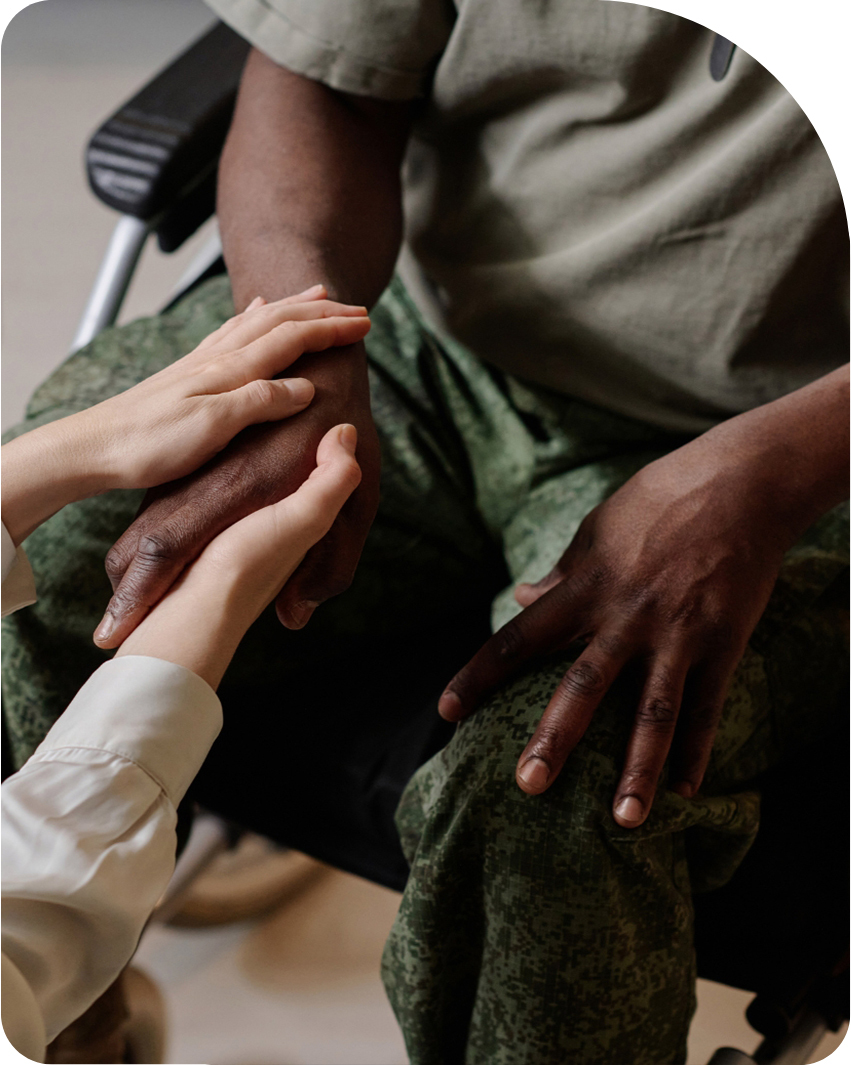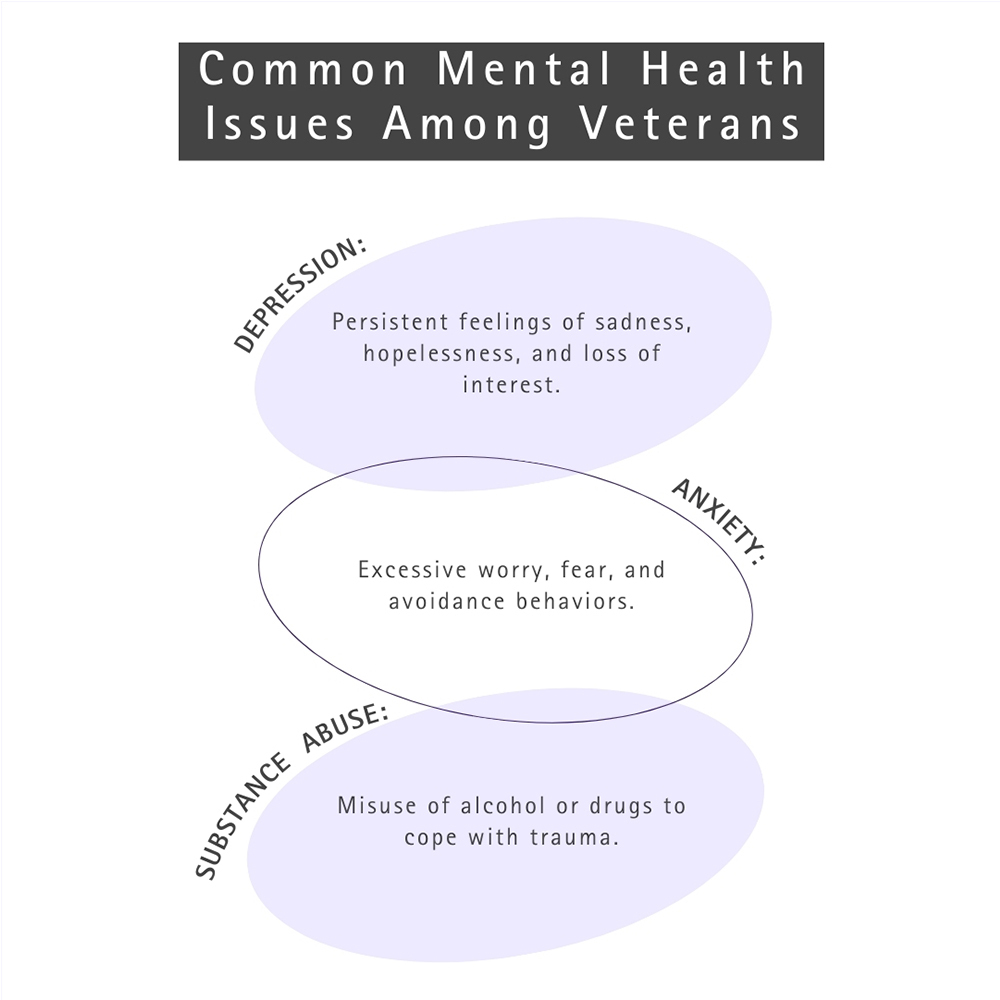 We understand the unique needs of veterans, and our focus is on offering personalized counseling tailored to your experiences. We recognize the importance of effective and compassionate care for those who have served our country.
We understand the unique needs of veterans, and our focus is on offering personalized counseling tailored to your experiences. We recognize the importance of effective and compassionate care for those who have served our country.
Our goal is to empower you on your journey to healing and well-being. You don’t have to face these challenges alone. Contact us today to embark on a path towards a brighter future. Your mental health matters, and we’re here to support you every step of the way.
What Is the Best Treatment for Veterans With PTSD?
You can choose any form of treatment for military combat PTSD. However, it is important to make sure you choose a provider who is certified in trauma therapy.
Some PTSD treatments include:
- Trauma-focused cognitive behavioral therapy (TF-CBT) in which your therapist will help you restructure your negative thoughts and belief patterns that resulted from your trauma.
- Narrative exposure therapy (NET) where you will create a more comprehensive and systematic representation of your traumatic memories.
- Prolonged exposure therapy (PE) is used to confront situations and memories that cause stress in a safe space.
- Eye movement desensitization and reprocessing (EMDR) which involves bilateral stimulation while reframing traumatic memories.
The type of therapy you choose depends on your personal preferences and your therapist’s recommendation. Your therapist will provide you with information on each type of therapy and you will choose the right one for you together.

Explore Military Combat Stress Trauma Therapy Online or In-Person
What Are the Top Mental Health Issues for Veterans?
Along with PTSD, veterans are often diagnosed with depression. Other comorbidities include anxiety and substance abuse or dependence. According to research, veterans with PTSD have poorer social functioning, higher rates of suicide attempts, worse treatment adherence, and less improvement during treatment than those without comorbid PTSD.
Embrace Healing The Power of Trust in Therapeutic Relationships
“In my experience, the most effective aspect of therapy is the therapeutic relationship. Establishing trust between a client and clinician is the first step to healing.”
What Qualifies as Combat PTSD?
Symptoms of combat PTSD include:
- Being disturbed by unwanted memories of the traumatic event
- Having disturbing dreams of the traumatic event that wake you up and makes it difficult to go back to sleep
- Dissociative flashbacks in which you suddenly feel as if the event was suddenly happening
- Becoming upset when something reminds you of the event
- Having a physical reaction to something that reminded you of the event
- Trying to avoid thoughts about the event
- Avoiding people, places, or things that remind you of the event
- Difficulty remembering parts of the event
- Strong negative beliefs about yourself, others, and the world
- Blaming yourself or others for the event or for what happened after
- Feeling fear, horror, guilt, or shame
- Being less interested in things you used to enjoy
- Feeling distant or cut off from other people
- Difficulty experiencing positive feelings
- Taking more risks than normal
- Being excessively watchful or alert
- Difficulty concentrating and sleeping
You may not experience all of these symptoms, as this is a comprehensive list used for the diagnosis of PTSD. PTSD symptoms can occur on a spectrum. If you experience any of these symptoms see a therapist that specializes in trauma for treatment.
Is Combat Stress Reaction the Same as PTSD?
Combat stress reaction (CSD) and post-traumatic stress disorder (PTSD) are similar consequences of traumatic military combat, with some differences. CSD is a temporary reaction to a highly stressful event that diminishes after the person has had time away from the situation. PTSD is a more serious and long-term condition.
Is Group Therapy for Veterans Effective?
Alongside individual therapy, group therapy has been proven to be the most effective form of therapy for veterans. Group therapy is an opportunity for veterans to share experiences with others and connect with people who have similar experiences and feelings.
Can Veterans See Private Therapists?
Veterans can see private therapists for treatment of CSD and PTSD.
Is There a Phone Therapist for Veterans?
Veterans can meet with their therapist in person, via telehealth, or over the phone. At the Trauma Therapy Center, we offer a variety of appointment types to fit into your busy schedule.
How Effective Are PTSD Treatments for Veterans?
According to a study published in PubMed, cognitive behavioral therapy (CBT) for veterans was shown to be highly effective. Research showed suicidal ideation in veterans after CBT decreased by 64%. Another study showed that prolonged exposure therapy (PE) decreased PTSD symptoms from 87.6% to 46.2%.
What Are the Goals of Therapy for Veterans?
Therapy can help veterans in the following ways:
- Reduce negative symptoms such as depression, anxiety, and difficulty sleeping
- Improve overall well-being in relationships, work, and personal life
- Adjust to life after the military
- Process difficult experiences and learn new ways of coping
- Learn self-care techniques and make healthy choices
- Develop a belief system that can also help handle future challenges more effectively
Reach out to us today and take the step towards reclaiming your mental well-being with military combat stress therapy in West Palm Beach. Your resilience deserves dedicated support, and we’re here to provide it.

